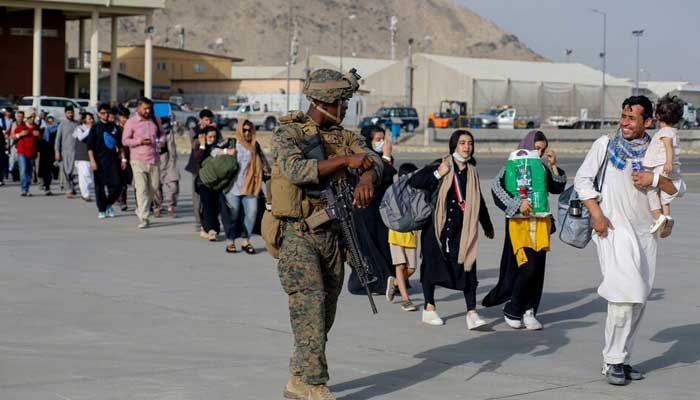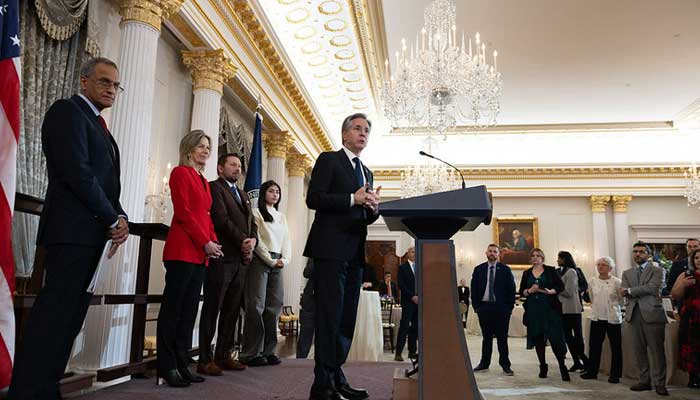
The United States of America faced the huge task of evacuating hundreds of thousands of Afghans who feared for their lives when Kabul fell to the Taliban.
With the end of the Biden administration’s term, a ceremony was held to thank everyone who helped in the evacuation.
He did not highlight the plight of countries forced to host millions of additional fleeing Afghans. But it mentioned those who played a role in providing safe exit to some other destinations.
The attendees noted that since the United States’ withdrawal from Afghanistan on August 30, 2021, the Biden administration has transferred and resettled nearly 183,000 Afghans. They were the ones who faced risks due to some connections with NATO forces.

They included interpreters, civil society activists, women leaders and their families who worked or stood for the United States and its allies during 20 years of invasion and occupation.
For many reasons, it was impossible for these families to stay when the Taliban retook Kabul on August 15, 2021. One rationale may have been their lifestyle.
Sorting them, and that too in the shortest possible time, was a herculean task. Therefore, those who made this possible were honored by holding this ceremony at the Ministry of Foreign Affairs.
US Secretary of State Antony Blinken was the chief guest. The famous Benjamin Franklin Room was filled with State Department officials, the White House core team, members of Congress, and representatives of various countries and non-governmental organizations.
Blinken mentioned Albania, Kosovo, the Philippines, Qatar and the United Arab Emirates, and chose to thank the rest by placing them in the group of “other countries,” which provided a safe haven for Afghans on their way to their new homelands.
He did not mention Pakistan or Iran, which have faced a new wave of millions of Afghan refugees since the Taliban took control of the war-torn country.
This may be due to the fact that the evening was mainly dedicated to Welcome Crops, a program launched by the State Department in 2023. This scheme provides an opportunity for US citizens to sponsor refugees in their communities.
AfghanEvac played the lead role, collaborating with a number of other NGOs and individuals. Hence, Washington was able to resettle nearly twice as many Afghans to the United States in 2024 than the previous year.
“More than 125,000 Americans have applied through Welcome Corps to be sponsors,” Antony Blinken told the audience.
However, more is still needed as there are still many waiting their turn by staying in temporary shelters provided by other host countries.
Other speakers include President Biden’s Homeland Security Advisor Liz Sherwood Randall. She is among those who played a pivotal role in coordinating the relocation and resettlement process.
Liz admitted that the bureaucracy was not designed for this arduous task. Hence, it needed to build a whole new system to welcome refugees on this scale.
On behalf of President Biden and the entire White House team, she thanked those who played their part in resolving the issues and resettling those who worked in the United States.
“Together, we have undertaken a noble effort that truly demonstrates what we are best as Americans: helping Afghans who have stood with the United States, and in doing so helping our fellow Americans open to and deliver on America’s continuing promise.” “The commitment that many of us feel to our partners,” Liz said gratefully.
She also reminded newcomers that “settling in a new country is difficult. Establishing relationships in a place where you do not yet master the language and where there are completely new customs, you depend on the kindness of strangers and the willingness of strangers.” Government at the federal, state and local levels to help you.”
Sean Vandiver, founder of Afghan Evac, which is dedicated to coordinating efforts to help Afghans move and resettle outside Afghanistan, also spoke on this occasion.
The Navy veteran began his speech by applauding international friends including Pakistan.
“I would also like to express my deep gratitude to our international partners who attended from Qatar, Albania, Kosovo, Pakistan, the Philippines and more. Without your support, this work would not have continued.”
He then painted a picture of Kabul with the Taliban taking control of Afghanistan, and recognized the services of those who volunteered their time, talents and treasures to make a difference in the lives of fleeing Afghans.
“When Kabul fell, we faced devastation, chaos, heartbreak and unimaginable loss. Lives were lost, dreams were shattered, and hope seemed distant. But in that devastating moment there was a glimmer of hope: all of you.”
By comparing the $2.23 trillion reportedly spent on the Afghan war with the roughly $2 billion annually spent on resettlement efforts, Vandiver also asked participants to measure the lives saved by evacuation.
Florence Boya, a young Afghan woman studying aerospace engineering at MIT who dreams of becoming the first Afghan astronaut, was also in attendance. She told her story of leaving Afghanistan when she was 15 years old, and how she spent two years of uncertainty in Qatar.
The walls of this historic place are decorated with paintings drawn by children as they desperately wait to board planes heading to the United States. Some painted loved ones or stunning views of their home country.
Antony Blinken highlighted the one bearing a line from the 13th-century Persian poet Jalal al-Din Muhammad Rumi, at the bottom of her painting.
She had a famous saying: “In this land, in this soil, in this pure field, let us sow no seeds but the seeds of compassion and love.”
It is unfortunate that, whether the British, the Soviets or the Americans, no “invading” superpower at that time was able to sow the seeds of compassion and love. They did not leave the country except by spreading thorns to the people or the region as a whole.
